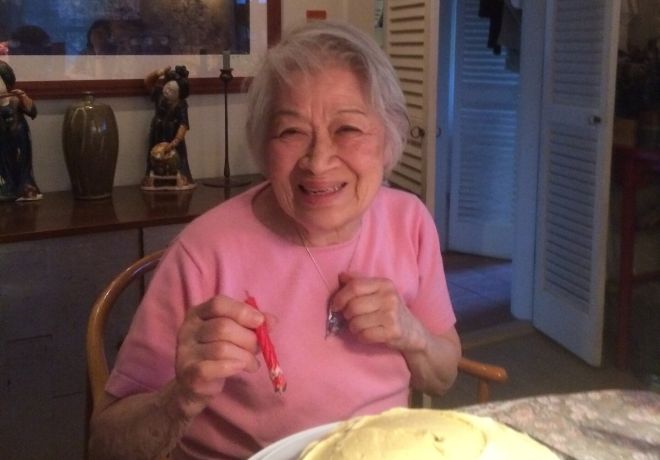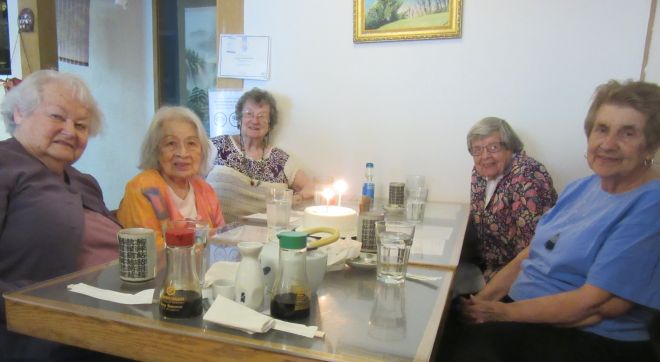May Takayanagi: In Memoriam
Published on September, 26 2024
By Virginia Pratt, Ellen Mass and Eileen Kurkoski
Boston Branch
September 2024
Sadly, we report the death of a long time activist and member of WILPF residing in Newton, MA. She was two months shy from her 100th birthday. The Boston Globe wrote an obituary for May, “May Takayanagi, peace activist, whose family was interned in World War II camps, dies” by Bryan Marquard, but some of her fellow WILFP members wanted to also share their memories of her.
Transforming Pain into Action
Virginia: May Takayanagi was a woman who lived her values — not only talking the talk, but walking the walk. She left us on March 13, 2024 at the age of 99. Her life was a life well lived. May became a lifelong advocate for justice because of the discrimination that she faced in her life. She transformed the pain of her past, from what could have been bitterness into empathy and action aimed at making the world a better place for us all.
Living in California as the USA entered World War II, May and her family were sent to internment camps for the crime of being Japanese; a shameful practice of collective punishment in US history. She never forgot the experience of being forced to live “like animals” in flimsy horse stalls in a large camp in Utah. It was a difficult time to be Japanese; May recalled that she got the American name ‘May’ when her school teacher could not remember her Japanese birth name. The discrimination against Japanese immigrants continued well into her early adulthood. She and husband had a hard time finding an apartment to rent in Cambridge, MA while he was a student at Harvard University. As a result of her experiences, May was a lifelong champion for fair housing.

From left, WILPF Boston members Nancy Wrenn, May Takayanagi, Joan Ecklein, ‘Libby’ Gerlach, and Pauline Soloman, at a celebration for May’s 97th birthday. Credit: Eileen Kurkoski
She was a peace and justice activist with numerous groups, including WILPF, the American Friends Service Committee, a democratic organization in her home town of Newton, MEDCO (a program for equal education) and a Japanese cultural organization. She applied her practical talents as a bookkeeper for the American Friends Service Committee and the WILPF Boston branch. Her records were meticulous. She was a very generous financial donor to the organization and other causes she cared deeply for. Despite all of the discrimination she faced, May was typically confident, cheerful, friendly, approachable, practical and very down to earth. She leaves an excellent example of how we can use pain in positive ways to help make the world around us more beautiful.
Passion for Justice
Ellen: May was highly dedicated to WILPF. For many years in Boston (about 30 years when I helped run the office), and especially during the era of Nell Elperin, Pauline Solomon and Sophie Pann, she was our dutiful treasurer and came to every meeting, and was always very very personable to each of us. They were wonderful predecessors, not to forget. Many deeply admired May’s independence and her closeness with her husband, who always picked her up from the meetings. Her impeccable note taking and memory of WILPF's work was uncanny. She was a very fashionable dresser as well.
Although I've not seen May in many years, even as she remained in the American Friends Service Committee, I remember how independent and confident she was about herself, and she used that confidence to bring others along and keep up with intricate politics around Vietnam. I never perceived her as someone who saw herself as oppressed, but as someone who was always up for righteous justice. In my recollection, she always put her personal experience on the back burner when speaking about the camp incarceration of Japanese immigrants. She appeared to be more into the justice issues.
May was very close to Pauline Solomon, Joan Ecklein and Nell Elperin. Together they hosted women from Russia and other countries for WILPF, and organized many conferences and meetings. May came to them all.



